Uncategorized
“Jambalaya, A Crawfish Pie, and A Toxic Gumbo”
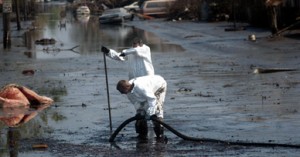 “My worst nightmare is the release of these contaminants that right now tend to be sequestered in environments that are not too mobile,”
“My worst nightmare is the release of these contaminants that right now tend to be sequestered in environments that are not too mobile,”
That's Texas A&M at Galveston Prof Patrick Louchouarn talking about the lack of wheels on over a dozen toxic-infested Superfund Sites in the Houston – Galveston area that might be subject to a great deal of involuntary mobility in the case of a hurricane striking the Gulf Coast again this season.
"In the case of hurricane-driven waters washing over and churning up soil and sediment, Louchouarn worries that the contamination will be dislodged and eventually consumed. At some Superfund sites there are signs warning people not to eat the fish from nearby waterways. The sites are along shorelines and one is even partially submerged in a river.
'In the long-term what we fail to realize is that when you have these major disturbances you reintroduce these long-lived contaminants that can stay in the environment and get into the food chain over decades.”
Full article from StateImpact/NPR here.
Turkey, Pollution and Authoritarianism
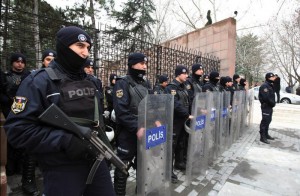 Events in Turkey remind us there's a direct connection between authoritarianism and pollution. Polluters depend on closed doors, opaque operations and a heavy hand – the same conditions that allow authoritarian governments to thrive. Because of ownership connections, supply contracts and employment pools, there's often no delineation between where government ends and industry begins – witness the 21st Century "Red Army Inc." in China, or the state-approved Russian Oligarchies.
Events in Turkey remind us there's a direct connection between authoritarianism and pollution. Polluters depend on closed doors, opaque operations and a heavy hand – the same conditions that allow authoritarian governments to thrive. Because of ownership connections, supply contracts and employment pools, there's often no delineation between where government ends and industry begins – witness the 21st Century "Red Army Inc." in China, or the state-approved Russian Oligarchies.
Corruption is institutionalized in such places. Pollution is just another form of state-sponsored crime that's overlooked by everyone that matters. With one large exception. When the crime is padding payrolls or skimming profits, it's not worth the trouble of ordinary citizens to speak out. It's a matter between the Powerful. But when the result of the crime is making your kids sick, or ruining your farm stock and land, then you have less to lose by fighting back.
And in a country run by an authoritarian government, what does fighting back mean? Well, it doesn't mean filing a complaint or going to court because those options are not allowed, or at least not allowed to be successful. Your options are very limited. That's why Chinese parents resort to kidnapping factory managers, and arson these days to protest new petrochemical plants. And it's one of the reasons why the events in Turkey took on a life of their own after being sparked by the brave stand of three people to save a park in Istanbul in the middle of the night.
One of the most serious misdiagnosis of the right is it's derision of everything "green" as the silly aspirations of white, middle-class youngsters with too-much-time-on-their-hands. Environmental health is a fundamental "freedom" issue. Invasion of your lungs and intestines with adverse foreign substances is the ultimate eminent domain issue. It's trespassing. Parents want to protect their kids from poisons. People want to breathe clean air and drink clean water. They want to look at things besides offices buildings and feel something besides concrete beneath their feet. To be Free, to Enjoy Freedom, human beings have to experience Free places – Smog Free, Pollution-Free, Sprawl-Free. This was the Libertarian-influenced force behind early American conservation and park-building – as championed by stout GOPer Teddy Roosevelt.
Oddly enough, it turns out that yearning isn't confined to Young White People in America, or even America itself. It seems to be a universal yearning that people in every continent have been increasingly expressing. To fight for environmental justice in Authoritarian-run countries is to be a true "Freedom Fighter." But most of the Right is deaf to this. The very constituencies you'd think it'd be championing – Chinese peasants getting shat on by their communist-in-name-only state-industrial complex – get ignored.
Now, granted Texas isn't a Turkey or a China, but you don't have to live in another country to see authoritarianism seeping into, and affecting, the politics of pollution. Exhibit A: the secret agreement between out-going Dallas city Manager Mary Suhm and Trinity East that was kept from the public for five years, even as it drove the city's agenda on gas drilling. That's a pretty clear example of the state and industry teaming up to become a single entity that had its own separate agenda from the public one either presented, as well as how the system is perverted to fit the deal instead of the public good.
To a lesser extent, severely restricting public comments at public meetings and the over-reacting to obnoxious hecklers is also part of this same strain. The less transparency for the deal makers, the better. The heavier the hand in quelling dissent, the better.
That's why fights over pollution are almost always fights over democracy too.
Frisco Promises a Stringent Clean-up Standard, Implements Cut-Rate One Instead
 (Frisco)— The local citizens group monitoring the clean-up of the former Exide lead smelter site in Frisco released a letter it’s sent to the Frisco City Council citing what they say is a contradiction between the City’s stated goal of meeting strict “residential” standards for toxic contamination removal, and the use of less-stringent “industrial-site” testing being used to identify that contamination.
(Frisco)— The local citizens group monitoring the clean-up of the former Exide lead smelter site in Frisco released a letter it’s sent to the Frisco City Council citing what they say is a contradiction between the City’s stated goal of meeting strict “residential” standards for toxic contamination removal, and the use of less-stringent “industrial-site” testing being used to identify that contamination.
Instead of testing for toxins eight times per acre, as required under the more thorough residential clean-up protocol, Exide is only sampling twice per acre, a methodology only used for industrial purposes.
“This is a classic bait and switch maneuver,” said Frisco Unleaded Chair Colette McCadden. “While publicly promising one “residential” standard for lead-in-soil clean-up of the “J parcel” that’s more protective of human health, Exide is actually using a much less rigorous testing methodology designed for sites that will see continued industrial activity. This is not an accurate description of future land use in the “J Parcel,” and is at odds with a commitment to a full residential standard clean-up.”
Frisco has committed to buying the outer ring of Exide property, referred to as the “J Parcel,” after a “residential or better” clean-up is achieved. The 2006 Comprehensive Plan for the city, as well as announcements last year from city officials, identified future land uses on the property that included office and commercial development, as well as a greenbelt along Stewart Creek. The site is directly across the North Dallas Tollway from the proposed location of the City’s huge new Grand Park that will host “water features” along Stewart Creek – directly downstream from the smelter site.
Frisco Unleaded states that the less protective industrial protocol is also at odds with the findings of a recent city-sponsored environmental assessment of the J Parcel, which reported new suspected contamination sites. The group linked the change in methodology to Exide’s deteriorating economic condition. Some analysts have predicted the company will file for bankruptcy for a second time in just over a decade. Last Friday, the company’s stock hit a nine year low of under 50 cents a share.
“We fear this downgrade in sampling protocol is an indication of the inadequate clean up citizens have predicted Exide would undertake because of its on-going financial difficulties. We need the City of Frisco to live up to its promise to provide expertise and oversight to prevent Exide from taking shortcuts that will come back to haunt redevelopment efforts.”
Frisco Unleaded is asking the City of Frisco to resolve the contradiction in favor of the residential standard for sampling and clean up by telling Exide it must abide by the agreements it signed. Frisco must approve the J Parcel clean-up before Exide gets nearly $40 million in cash for the land. McCadden says that gives the city a lot of leverage.
“Frisco city leaders should demand that Exide honor the agreement and work toward a real ‘residential or better’ clean-up of this property. We’re asking that they use that influence on behalf of Frisco residents.”
Frisco Kids Play Within Feet of a Hazardous Waste Dump
This is a 23 second video shot on the corner of Eubanks and 5th Street in Frisco earlier this month. This corner is the northeast border for the property owned by the Exide lead smelter.
When it begins, the camera is looking south toward the now shuttered smelter. In fact, at the 3-second mark, you actualy see the smelter's smokestacks betwen two trees for a brief moment. In front of those trees is the fenceline separating the smelter property from the public. Immediately behind those trees is a berm that marks where the smelter's active landfill is.
This "non-hazardous" landfill holds approximately 9 million pounds of lead-contaminated waste. Lead itself is dangerous, but Exide got caught illegally burying hazarous waste in this non-hazardous landfill. The company's remedy is to dig the hazardous waste up, "re-treat it" and then re-bury it in exactly the same landfill. All this is to be done at the edge of the smelter's property at this corner of Eubanks and 5th.
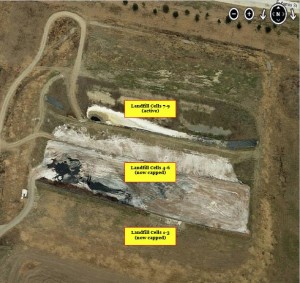
This is an aerial pic of the Exide active landfill operation at the corner of Eubanks and 5th Street. The line of the trees at the top right are the same ones you see in the video.
Besides this waste from production, Exide is now using the landfill to dispose of as much smelter demolition waste as possible. That makes it the most active spot on the smelter property at this point, with trucks full of waste coming and going besides the on-going "digging and "re-treatment" there.
And when Exide is finished stuffing all the lead-contaminated waste it can into this landfill, it hopes to leave it buried in Frisco forever.
Directly across the street from this illegal hazardous waste landfill is the "Play Ball" rec center for kids – a batting cage business. On nice days, you can usually find the south-facing/smelter-facing metal garage door wide open to allow for air circulation for the kids taking practice inside.You can also find their sibings and peers playing on the front driveway, only about 50-100 feet away from the lip of that landfill berm.
When the wind is out of the south, as it often is from March to October, the Play Ball batting cages and the kids there are are directly downwind of the smelter and the landfill operation. A lead-in-air monitor operated by the the Texas Commission on Environmental Quality is located on Eubanks. It's that skinny white pole in the middle of the frame at the 5-second mark. This monitor has repeatedly found concentrations of lead in the air higher than the EPA's new national lead in air standard – since the smelter closed.
So not only are these kids subject to being downwind of all of the smelter's demolition activity. They're also just across the street from the most heavily used part of the smelter now, with a much larger risk of getting contaminated.
Exide, the City of Frisco and the Texas Commission on Environmental Quality all would have you believe that everything is hunky-dory at the lead-smelter site. Look, the smokestacks are coming down! But in reality, this site is still posing risks for Frisco children who are still playing right across the street.
How an Orphaned NYC Garbage Barge Began the Recycling Boom in America
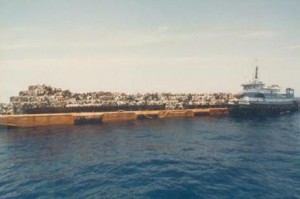 There's a new short video series called "Retro Report" that the New York Times is producing. Its first effort is about the wayward voyage of the Mobro 4000 – not a new video game, but a six-million ton floating pile of New York City garbage that captured the nation's attention in 1987. 12 minutes of interesting history on how we got here from there.
There's a new short video series called "Retro Report" that the New York Times is producing. Its first effort is about the wayward voyage of the Mobro 4000 – not a new video game, but a six-million ton floating pile of New York City garbage that captured the nation's attention in 1987. 12 minutes of interesting history on how we got here from there.
Early Voting Starts Today
 Today is the first day of early voting in municipal elections throughout North Texas. Along with some high stakes city council races there are also lots of local propositions. Of course, of greatest interest to our Dallas supporters is the post-election make-up of of the city council that looks like it will decide the fate of the Trinity East gas permits. If you want to make a difference in June, please get out and support the candidates who are standing against irresponsible urban drilling, including longtime Downwinders supporter Claudia Meyer. This time, it counts.
Today is the first day of early voting in municipal elections throughout North Texas. Along with some high stakes city council races there are also lots of local propositions. Of course, of greatest interest to our Dallas supporters is the post-election make-up of of the city council that looks like it will decide the fate of the Trinity East gas permits. If you want to make a difference in June, please get out and support the candidates who are standing against irresponsible urban drilling, including longtime Downwinders supporter Claudia Meyer. This time, it counts.
You’re Not Nearly As Safe As You Think You Are
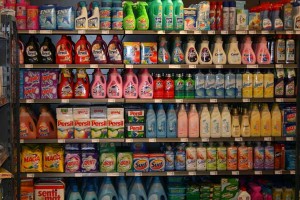 Most Americans assume that by the time a product has made it to market, it must have been tested for its toxicity. Nope. Not even close. Of the approximately 85,000 chemicals available to a consumer in the US, only a tiny fraction have been tested for their impact to human health, or for their health impact in combination with the other 84,999 chemicals.
Most Americans assume that by the time a product has made it to market, it must have been tested for its toxicity. Nope. Not even close. Of the approximately 85,000 chemicals available to a consumer in the US, only a tiny fraction have been tested for their impact to human health, or for their health impact in combination with the other 84,999 chemicals.
Or for that matter, their impact on downwind populations breathing their smoldering remains from cement kilns burning garbage for fuel.
This is one reason why babies are born "pre-polluted," hosting a laundry list of synthetic chemicals inside their tiny bodies before they're even out of the womb.
There is a federal law that's supposed to prevent toxic chemicals from entering the marketplace, the Toxic Substances Control Act. But as this article from the New York Times reminds us, it's "the only major environmental statute whose core provisions have not been re-authorized or substantively updated since its adoption in the 1970s," when there were maybe only 25,000 chemicals untested.
There is now a presumption under the law that a substance is "safe until proven guilty." This is exactly opposite of what a logical approach would look like, given all we know about the toxicology of chemical exposure. Indeed, this is why there's an explicit alternative in the form of the "Precatuonary Principle" that says a chemical should not be marketed until it's thoroughly tested for health impacts.
And sure enough, there's some congressional pressure to change the 40-year old law to reflect modern science.
Federal reform of the toxic substances act may be coming. Last week, Senator Frank R. Lautenberg, Democrat of New Jersey, and Senator Kirsten E. Gillibrand, Democrat of New York, introduced a bill called the Safe Chemicals Act of 2013, which would require the chemical industry to demonstrate that a chemical is safe in order for it to be sold. The bill, which has more than 25 Democratic co-sponsors, would put limits on trade secret practices and requires industry to reduce use of the chemicals designated by the E.P.A. as being of “greatest concern” because they are most toxic.
There is zero chance of such a bill making it through this House, or perhaps even this theoretically Democratically-controlled Senate, but it's good to begin having the discussion,because even the industry folks are beginning to act a little nervous about the gap between perception and reality.
Time to Tell the Dallas City Council: Vote NOW and Vote NO
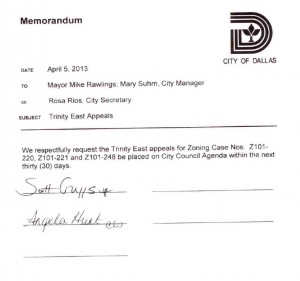 Tired of fighting a rear-guard battle over 2007 gas leases that should have been dead and buried by now? Us too. And so are Dallas Council members Angela Hunt and Scott Griggs.
Tired of fighting a rear-guard battle over 2007 gas leases that should have been dead and buried by now? Us too. And so are Dallas Council members Angela Hunt and Scott Griggs.
Last Friday they circulated this memo to their 13 other council colleagues looking for three – just three – signatures to add to their own in officially calling for a vote on the Trinity East gas permits. They need five members to make sure it goes, and stays, on the council's business agenda. As of Monday, they hadn't gotten any takers.
This is important because right now, with this council that meets until May, Angela and Scott believe they have the four "no" votes it would take to prevent the council from overturning the City Plan Commission's denial. If they're right, such a vote would be the last word on the matter and the permits would finally be history.
A couple of months ago, supporters of the permits wanted a vote ASAP. Now, not so much. That was before citizens won two consecutive votes on the permits before the City Plan Commission despite City Hall and industry's best efforts to try and steamroll them through. Now, supporters say, it's time to slow down and wait for maybe the next council – which could be even more pro-drilling than this one. They say this with a straight face even though Trinity East itself is calling for a vote on the permits now, just like us.
Which is why we need you to once again let your fingers do the protesting and send a quick click n' send e-mail message to all 15 city council members: Vote NOW and Vote NO.
In particular, these current city council members are running for re-election in contested races this year:
Delia Jasso and Scott Griggs are running against each other in District 1.
Vonciel Jones in New District 3, running against gas permit opponent and grassroots advocate Claudia Meyer.
Monica Alonzo in District 6, running against Raymond Salinas.
If you can vote in a contested city council race, please make sure you note this in your message to the council, along with the fact that not signing Hunt's and Grigg's memo will factor in how you vote in that race. And to learn how all the city council candidates responded to the Dallas Morning News's question about gas drilling, please see our Breather's Guide to the Dallas City Council Races.
You've been so good about showing-up when you needed to. Don't think this fight is won yet. The fate of these gas permits is still undecided.
We need all of you to take a minute and send your message to the Mayor and entire council now. We get five signatures and bring this to a vote before May 11th and we'll never have to bug you about going to yet another meeting about the Trinity East permits again. Do it now: https://www.downwindersatrisk.org/featured-citizen-action/
Thanks.
Over 1 Million Deaths a Year from Air Pollution In China
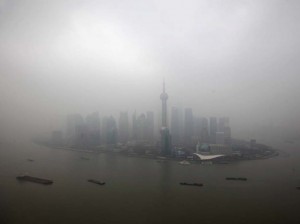 Is this what happens when all the polluters "move to China?"
Is this what happens when all the polluters "move to China?"
Earlier this week, a consortium of entities, including the US EPA , the car industry and an assortment of research institutions released a study estimating that Chinese air pollution caused over 1.2 million early deaths in 2010 alone, or almost 40% of the world's total.
In this case, the villian is Partciulate Matter, seen by scientists as an increasingly serious health threat because of the variety of problems it can cause, from heart trouble to Parkinson's-like brain damage.
This new study arrives at a moment in history when much of the Chinese population is waking up to how bad their air is. Blocked from discovering official meaurements of pollution, citizens are pooling their resources and buying their own monitoring equipment. Unable to fight permits, residents often turn to direct action to shut down an plant. These days, some of the most radical environmentalists on the planet are often Chinese middle-class parents.

